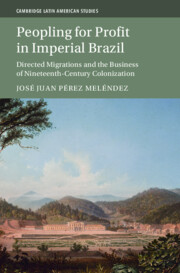 Peopling for Profit in Imperial Brazil
Peopling for Profit in Imperial Brazil Book contents
- Peopling for Profit in Imperial Brazil
- Cambridge Latin American Studies
- Peopling for Profit in Imperial Brazil
- Copyright page
- Dedication
- Contents
- Figures
- Tables
- Acknowledgments
- Note on Currency and Language
- Abbreviations
- Maps
- Introduction
- Part I Colonization’s Statecraft
- Part II Colonization Companies and the Colono Trade
- Part III Disentangling Companies and State
- Part IV Peopling the Country of the Future
- 9 At the Doorstep of Mass Migrations
- Conclusion
- Bibliography
- Index
- Series page
9 - At the Doorstep of Mass Migrations
from Part IV - Peopling the Country of the Future
Published online by Cambridge University Press: 26 September 2024
- Peopling for Profit in Imperial Brazil
- Cambridge Latin American Studies
- Peopling for Profit in Imperial Brazil
- Copyright page
- Dedication
- Contents
- Figures
- Tables
- Acknowledgments
- Note on Currency and Language
- Abbreviations
- Maps
- Introduction
- Part I Colonization’s Statecraft
- Part II Colonization Companies and the Colono Trade
- Part III Disentangling Companies and State
- Part IV Peopling the Country of the Future
- 9 At the Doorstep of Mass Migrations
- Conclusion
- Bibliography
- Index
- Series page
Summary
Amid epidemics, droughts, and a bourgeoning abolitionist wave in the late 1870s and 1880s, the Brazilian Empire internalized migration protocols long in the making. Crucial to the development of new migration policies was the Sociedade Central de Imigração (SCI), a new association midway between a corporation and a literary club. The SCI and its abolitionist members, which included conservative noblemen and republican professionals, synthesized the lessons learned by three generations of political elites, and avidly lobbied for reform policies pertinent to land surveying and distribution, naturalization, and immigration promotion. Dismissed by scholars as a bourgeois and largely failed experiment in immigration advocacy, the SCI in fact furnished the policy tools for the Brazilian government to counter German and Italian interdictions on migrations to Brazil, which, as the chapter demonstrates, had more to do with commercial and geostrategic concerns than with immigration issues themselves. Ultimately, the SCI laid the building blocks for the new Republican government to welcome exponentially growing cohorts of migrants despite the persistence of international prohibitions in Italy.
Keywords
- Type
- Chapter
- Information
- Peopling for Profit in Imperial BrazilDirected Migrations and the Business of Nineteenth-Century Colonization, pp. 293 - 320Publisher: Cambridge University PressPrint publication year: 2024
